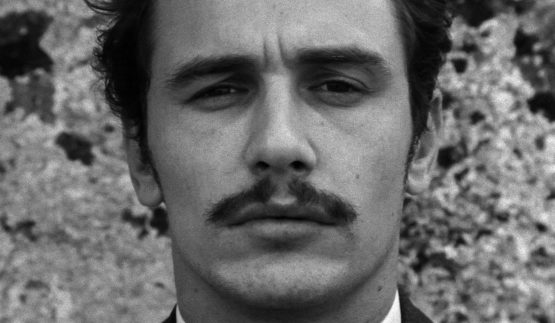-
Dave FrancoJames Franco...
-
Drama
-
Out now
-
James Franco
Yasmin Shehab

This
is a case of somebody making a film about a subject, or in this case a person,
that they love so much to the point that they don’t care what the outcome’s
like. The process gives them a chance to act on their love in the most personal
way possible and that’s all they’re aiming for. This isn’t a film for James
Franco fans; this is a film for Hart Crane fans. To actually be able to get
into it, you need to share Franco’s love for the poet, or at the very least, a
healthy appreciation for his work.
Having
said that, the film needs a viewer with prior knowledge of the man and his
work, not just to be able to fully appreciate his genius, but to actually be
able to follow the story. It follows Crane’s (Franco) life from his time as an
aspiring poet, stuck doing menial labour in his dad’s factory, right up to his
suicide at the age of thirty-two. The film is divided into various disjointed
segments, each chronicling a different part or aspect of his life. The most
engaging and illuminating part takes place fairly early on and it is when Crane
describes his poetic voice as one that’s based more on happiness than just
giving in to despair.
Most
of the other segments focus on either his romantic partners or his drinking
problems, occasionally both, and they cause the film to lag considerably. With
the former, his partners are just a bunch of anonymous faces. They’re
practically interchangeable especially as their main characterisation is that
Crane is smitten with them. As for his alcohol abuse, one segment he’s drinking
normally when suddenly in the next, he’s puking on the pavement. The change is
too abrupt depicting him more as a drunk not a drunkard; a fact that only
becomes clear after we recurrently see him drunkenly prancing around a bar.
This isn’t an acting problem, especially as Franco is perfectly decent as the
poet, as much as it is a writing one.
The
segments are linked together with either bits of letters Crane had written or
bits of poetry being narrated. The letters are pretty easy to follow but the
poetry just washes over you, unless of course you have a natural aptitude for it
or a prior familiarity with Crane’s work.
This
isn’t a conventional type of film and it’s intentionally targeted to a niche
audience, but Franco’s passion for the poet and this film is clear and makes it
rather endearing. He just made a film for the hell of it which is pretty brave
and quite admirable – even if he is the only person who’ll end up liking it.
Write your review
recommended
 Cafés
Cafés
Bite Into the Croffle Craze: The Best 5 Spots to Try Croffles in Cairo
cafes cairo +2 City Life
City Life



